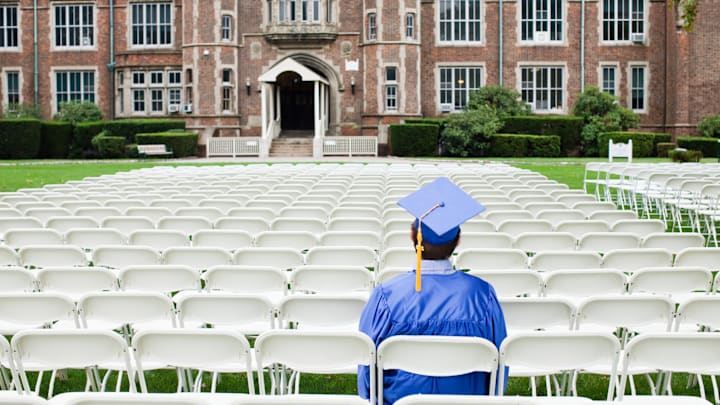Choosing where to attend college remains one of the most important decisions of a person’s life. The right school can carve out a path toward a rewarding career; the wrong one can leave a graduate with debt and regret. (One easy benchmark test: Whether a school can produce students who earn more on average than a high school graduate. Many, but not all, do.)
Some aim for colleges that are notoriously difficult to breach on the premise that a better education from an institution can mean better career opportunities. Recently, education advocacy site Niche examined the current crop of schools that are among the most difficult to gain admission to. Generally, this means a low acceptance rate and a high bar for credentials. Here are the 25 that are the most selective when it comes to handing out acceptance letters:
- Minerva University (San Francisco, California) // 1 Percent
- California Institute of Technology (Pasadena, California) // 4 Percent
- Stanford University (Stanford, California) // 4 Percent
- Harvard University (Cambridge, Massachusetts) // 4 Percent
- Massachusetts Institute of Technology (Cambridge, Massachusetts) // 4 Percent
- Columbia University (New York, New York) // 4 Percent
- Princeton University (Princeton, New Jersey) // 4 Percent
- Yale University (New Haven, Connecticut) // 5 Percent
- Brown University (Providence, Rhode Island) // 6 Percent
- University of Pennsylvania (Philadelphia, Pennsylvania) // 6 Percent
- Duke University (Durham, North Carolina) // 6 Percent
- Dartmouth College (Hanover, New Hampshire) // 6 Percent
- University of Chicago (Chicago, Illinois) // 6 Percent
- Pomona College (Claremont, California) // 7 Percent
- Northwestern University (Evanston, Illinois) // 7 Percent
- Vanderbilt University (Nashville, Tennessee) // 7 Percent
- Johns Hopkins University (Baltimore, Maryland) // 8 Percent
- Swarthmore College (Swarthmore, Pennsylvania) // 8 Percent
- United States Naval Academy (Annapolis, Maryland) // 8 Percent
- Cornell University (Ithaca, New York) // 9 Percent
- Amherst College (Amherst, Massachusetts) // 9 Percent
- Bowdoin College (Brunswick, Maine) // 9 Percent
- Williams College (Williamstown, Massachusetts) // 9 Percent
- Colby College (Waterville, Maine) // 9 Percent
- Rice University (Houston, Texas) // 9 Percent
The list has changed somewhat since Niche’s 2023 rankings, which placed Harvard at the top of the list. (It’s now ranked number four.) Coming in first is Minerva University, which is somewhat of an anomaly in higher education. The school is small—it turned out 400 graduates as of 2021—and sends students to different continents as part of its curriculum. Part of the school’s admissions process is a “series of online challenges designed to measure” how applicants “think and communicate.”
The California Institute of Technology, or CalTech, comes in second. The science and engineering-heavy hub has a favorable student-to-faculty ratio of 3:1. According to U.S. News and World Report, a high school class ranking is considered important for applicants.
Stanford University relies heavily on the GPA and SAT scores of applicants. Less than 5.5 percent of new students have an SAT score below 1400.
Acceptance rates don’t tell the complete story. Prospective students are still evaluated based on their merits. Beyond grades, selections can come down to expressing a desire to learn and overcome challenges and expressing individuality beyond rote essays. And, of course, being able to pay tuition.
If selectivity is not for you, you can always consider schools with more forgiving acceptance rates. In 2022, Adams State University in Alamosa, Colorado, welcomed 100 percent of applicants.
Read More Stories About Education Here:
[h/t Niche]
